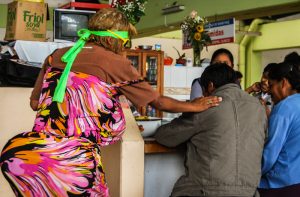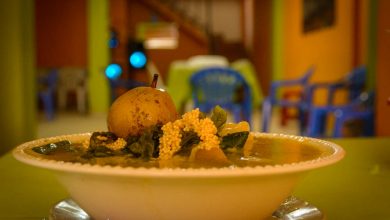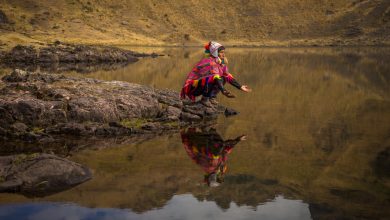How do You Talk to a Stranger in Cuzco, the Use of Mami and Papi

How do you talk to people you do not know? What terms do you use to speak to them? In American English, we use the person’s first name or the omnipresent and omni-use “you”. In Peruvian Spanish there are a lot of words, but there is one way of talking to other people that is found all over Cuzco and seems vaguely strange if used elsewhere.
In the Imperial city, and other parts of its region, you often hear complete strangers refer to each other in Spanish as “mamá” or “papá”, words that roughly translate as “mother” or “father” in English.
If people want to give some cariño–that ever present touch that makes social relations smooth and which is so damn difficult to even begin to express in English, other than through such presumptuous words as warmth, closeness, social distance, or some such–then you say “mami” or “papi”. These mean, “mommy” or “daddy”.
Can you imagine going up to a complete stranger, no matter their age or social status and saying something like “hi daddy, can you tell me where the nearest Starbucks is?”
I am a native speaker of American English, who grew up in the Southwest part of the United States, at a time when people used “sir” and “ma’am”. There is no way I could presume such familiarity.


Maybe you can, but I doubt it. Even people who speak much more familiarly and easily than people like me do not usually call people they do not know mommy or daddy, especially if they are not of the appropriate age for that relationship to you.
But in Cuzco they do, all the time, every day. For example, yesterday I was grabbing a cab with a friend who is a prominent administrator at a local university. She got in first and told the cabby the direction we were going and he answered “ya mami”, “ok mommy”. She answered him back using “papi”, “daddy”.
If I am thinking in English, this just seems weird. In two ways. The first is using a term I normally use for my parents and use it for someone else, no matter their age or relationship to me. I mean if someone has a relationship to me like that of my parents, I suppose I could call them “mom” or “dad”.
The second is when a man calls a woman “mommy” and she answers back “daddy”. If he is her son, even in fiction, then why is she acting as if she were his daughter in response. It seems so confusing and, at the same time, reminds me of really old people in the US who would refer to their spouse using their child’s or children’s term for them.
I guess I can kind of understand the elderly Americans, since having children was such an important means of defining a couple, perhaps even more than their legal marriage or love for one another. But in Cuzco, if there is an implication of children, it is far away from the interaction and really quite hypothetical.

Instead, Cuzqueños are borrowing the idea of parenthood and making it the standard for how they expect others to treat them and them to treat others. So either you are a parent or a child in an interaction and in the very next breath become a child in relationship with the same person who is now your parent.
The terms take the ideals of parent child interaction and generalize them as norms for all kinds of engagements with other people. As a result, the term itself is not good enough to get the desired parental response.
Just saying the formal word “mamá” or “papá” builds a formal relationship. If you want more, you need to add cariño, that inexplicable seasoning of the social stew. To do this you can say “mami” or “papi”, or you can also go where English cannot go. You can say “mamita” or “papito” by ading the suffix that is called a diminuitive (although it really such be called a “cariño-itive”).
Or you can go the next step and add softness and delicacy through changing your tone of voice or the pitch of your words. Cariño is not a simple thing, but something that changes constantly and requires verbal dexterity in knowing how to add it or take it away in any given situation.
While in English, the biological relationship between children and their mothers, certainly–and their fathers, perhaps–is the basic understanding of the terms mother/ son or daughter, in Cuzco’s Spanish that notion is more tenuous and far removed. Instead it the relationship is about giving cariño, which the includes taking care of the other or having the legitimacy to ask to be cared for.
Students of kinship terms in the US, such as in anthropology classes, often have a really hard time when told that one of the most common systems of terms in the world, called Hawaiian though used by far more people than just Polynesians, involves extending the relationship of child/parent to all the adults in your social group. If people are younger than you they are children and if older then they are parents.

Americans always ask, “but don’t people know who their real mother is?” The answer is yes, but that is not as important as building the relationship with all adult women in the group.
In Cuzco, they have carried this further. Like the word “you”, the parenting terms are shifters; instead of referring to something that is absolutely true of the person (an “I” is never absolutely a “you” simultaneously), they refer to a position in an interaction (one moment you are a “you” and then you are an “I” as you take turns talking). So one moment you are a mami and the next a child even if that is never said in that term. (I have almost never heard people call a person my child “hijo” or “hija” unless they have that relationship of kinship already established. To do so, it seems to me, would suggest arrogance and superiority.
People here use “mamá” and “papá” or “mami” and “papi” to build ties characterized by cariño and by relativity or shifting. Learning to use these terms make life so much easier in Cuzco, even if you are just passing through.




